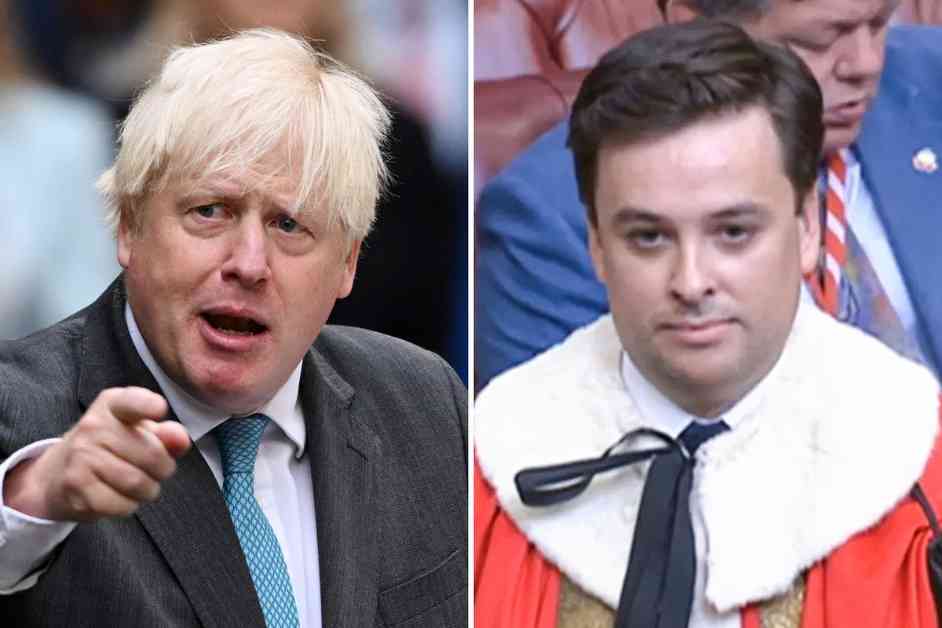The transformation of Lord Kempsell from a controversially elevated peer by Boris Johnson to a prominent figure in the world of public relations has raised eyebrows and sparked accusations of cronyism. As the sole director of the PR firm Hyannis Strategy, Lord Kempsell has amassed an impressive £2m in assets within just 12 months. Among the firm’s clients is none other than former Prime Minister Boris Johnson himself, who has also been reported to join the news channel GB News, which has a contract with Hyannis Strategy.
The appointment of Lord Kempsell to the House of Lords last year has not gone unnoticed, with critics pointing to his close relationship with Mr. Johnson as evidence of favoritism. His involvement in efforts to protect Mr. Johnson’s position during the Partygate scandal, as well as his personal connections to the Prime Minister’s wife, Carrie Johnson, have only added fuel to the fire of speculation surrounding his rapid rise to power.
Furthermore, recent revelations have shed light on the close ties between Lord Kempsell and other influential figures in the political and business world. For instance, the appointment of Charlotte Owen, now Baroness Owen of Alderley Edge, to the environmental consultancy Better Earth, where Mr. Johnson serves as co-chair, has raised questions about the extent of influence and connections within the inner circles of power.
Amidst these controversies, Lord Kempsell’s business dealings and financial interests have come under scrutiny. Companies House records reveal that Hyannis Strategy, previously known as Good Night and Good Luck Media, boasts assets exceeding £2m, with Mr. Kempsell listed as the sole director. The firm’s client list includes the Office of Boris Johnson Limited, the Policy Exchange think tank, and GB News, among others.
Despite the mounting concerns over potential conflicts of interest and allegations of cronyism, Lord Kempsell maintains that he has done nothing wrong. His register of interests in the House of Lords discloses his involvement in various businesses, including Maple Research Limited and Arcani Intelligence Ltd, as well as his advisory roles at WJL Partners LLP and Grayling, a PR and public affairs agency.
In addition, Lord Kempsell’s travels and engagements with foreign governments and private entities have raised eyebrows. Trips to Israel, Bahrain, and Qatar, funded by respective governments, as well as hospitality from Turkish Airlines and the Turkish government, have drawn attention to the potential influence of external actors on his activities and affiliations.
The controversy surrounding Lord Kempsell and his associates, including Lady Owen, has not gone unnoticed by the public and political commentators. Both individuals were named in Mr. Johnson’s resignation honors list, which sparked outrage and accusations of cronyism from opposition parties. The close ties between these figures and the former Prime Minister have raised concerns about the integrity and transparency of the political establishment.
In response to these allegations, Lord Kempsell and Lady Owen have remained tight-lipped, refusing to address the growing concerns surrounding their business dealings and affiliations. GB News, the news channel with ties to Hyannis Strategy, has also declined to comment on the matter, further fueling speculation about the potential conflicts of interest at play.
As the controversy continues to unfold, it is clear that the close relationships between Lord Kempsell, Lady Owen, and other influential figures in the political and business world are under scrutiny. The revelations surrounding their business dealings, financial interests, and interactions with foreign governments raise important questions about transparency, accountability, and integrity within the corridors of power.
The Ethics of Political Influence
The case of Lord Kempsell and Lady Owen underscores the ethical dilemmas and potential conflicts of interest that can arise when individuals with close ties to political leaders are elevated to positions of power and influence. The blurred lines between personal relationships, business interests, and political affiliations raise important questions about the integrity and transparency of the decision-making process within the government.
The perceived favoritism and cronyism surrounding the appointments of Lord Kempsell and Lady Owen to prominent positions in the House of Lords and the business world have sparked public outrage and calls for greater accountability from those in power. The lack of transparency surrounding their business dealings, financial interests, and interactions with foreign entities has only added to the skepticism and distrust among the general public.
The Impact of Cronyism on Democracy
The prevalence of cronyism and favoritism in politics poses a significant threat to the principles of democracy and accountability. When individuals with close ties to political leaders are given preferential treatment and access to power, it undermines the fairness and legitimacy of the political system.
The case of Lord Kempsell and Lady Owen highlights the dangers of unchecked influence and nepotism within the corridors of power. The lack of oversight and accountability in their business dealings and financial interests raises concerns about the potential for corruption and abuse of power within the political establishment.
The Need for Transparency and Accountability
In light of the controversies surrounding Lord Kempsell, Lady Owen, and other influential figures in the political and business world, there is a pressing need for greater transparency and accountability in the decision-making process within the government. The public has a right to know about the business dealings, financial interests, and interactions of those in positions of power and influence.
As journalists, it is our duty to hold those in power accountable and to shine a light on the potential conflicts of interest and ethical dilemmas that arise in the course of political decision-making. By uncovering the truth and exposing the facts, we can help to ensure that the principles of democracy, transparency, and accountability are upheld in our society.












